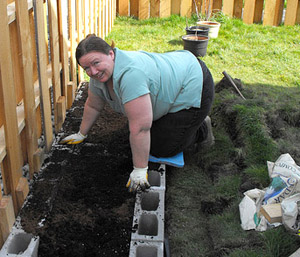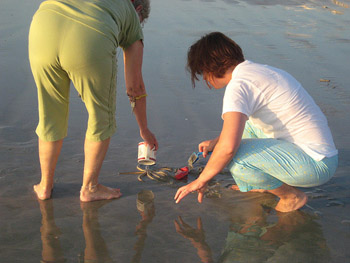Connecting Contrary Ideas to the Thesis

Source: “New Idea,” David Roessli, Flickr
You don't want to go from the backward thinking to forward thinking (from contrary ideas to your own ideas) too abruptly. That would be like shifting from reverse to drive without braking. You have to ease into your thesis with a sentence or two of transition.
Read the contrary statements below. They lead to a thesis about how good it feels to do physical work. The contrary statements begin the introduction, and the thesis statement ends the introduction. Which of the transitional statements in the list do you think would create a smoother transition from the contrary statements to the thesis (in bold)? Check Your Understanding for a discussion of the three choices after you have read through them and thought about which choice best completes the introduction.
Many people like to avoid hard physical work whenever they can. They hire someone to mow the lawn rather than do it themselves. They rent a machine to dig a hole rather than get out a shovel. They wait for a bus for thirty minutes rather than walk ten blocks down the street. [Insert choice A, B, or C from below.] Hard physical work can make you feel good.

Source: “Raised Bed Garden,” Cronewynd, Flickr
A. These people are missing out on the benefits of physical work. They are trying to avoid physical work whenever they can, but doing so also denies them a significant pleasure.
B. These people are spending a lot of money having other people work for them. And they are wasting a lot of time. They should realize that time is money.
C. I have to take a bus to work after school because my work is too far for me to walk to. I couldn’t walk instead of taking the bus because I would be late for work.
Probably, you picked choice A. This is the best choice. If you chose B, you are almost—but not quite—right. If it weren’t for that sentence about “time is money,” this would be a reasonable choice. But “time is money” is not the point and does not lead to the idea that hard work makes you feel good.
If you chose C, you are, again, close to a good answer. If an additional sentence were added to C, it might work, depending on what was added. For example, C. might work if you added “I can’t be late to work so I have to ride the bus, but I know that if I could walk it would improve my mood just like mowing the lawn improves my mood. It seems strange, but it’s actually true: physical work can make you feel good.”
Wrapping Up the Introduction

Source: “rescue mission,” jodimarr, Flickr
 Using your notes again, write an introduction for your “Starfish” essay. Your thesis is “Small differences are worth making.” Click the link to open the webbing chart, which includes the contrary statements from earlier in this lesson. Choose several (at least three but no more than five) of the contrary statements to start your introduction. Then make a transition to the thesis with one or two sentences. When you’re finished, check your understanding to see one of many possible introductions.
Using your notes again, write an introduction for your “Starfish” essay. Your thesis is “Small differences are worth making.” Click the link to open the webbing chart, which includes the contrary statements from earlier in this lesson. Choose several (at least three but no more than five) of the contrary statements to start your introduction. Then make a transition to the thesis with one or two sentences. When you’re finished, check your understanding to see one of many possible introductions. Sample Response:
Many people think that it’s a waste of time to wash some of the dishes if there isn’t time to wash them all. Many people think that it’s useless to pull up a few weeds if they are going to leave some of the weeds to pull up later. Many people think that throwing away trash when they eat at a fast food restaurant is pointless if there are many tables where people have left the trash for someone else to pick up. Many people think that taking a cloth bag to the grocery store is a silly idea when most of the shoppers there use the plastic bags the store provides. All of these people are thinking that doing something is not worth doing unless it makes a big difference. They think all the dishes have to get done, all the weeds have to be pulled, all the trash has to be thrown away, and all the plastic bags have to be completely eliminated. This kind of thinking just stands in the way of anything changing. Small differences still make a difference. Small differences are worth making.
This lesson gives you one idea for writing introductions. There are many, many other possibilities: using anecdotes, using a series of questions, using interesting facts, and so on. The important point is that your introduction should bring up the topic just as you would have to bring up a topic in a conversation. After a transition of some sort, it should also state your main point or thesis.